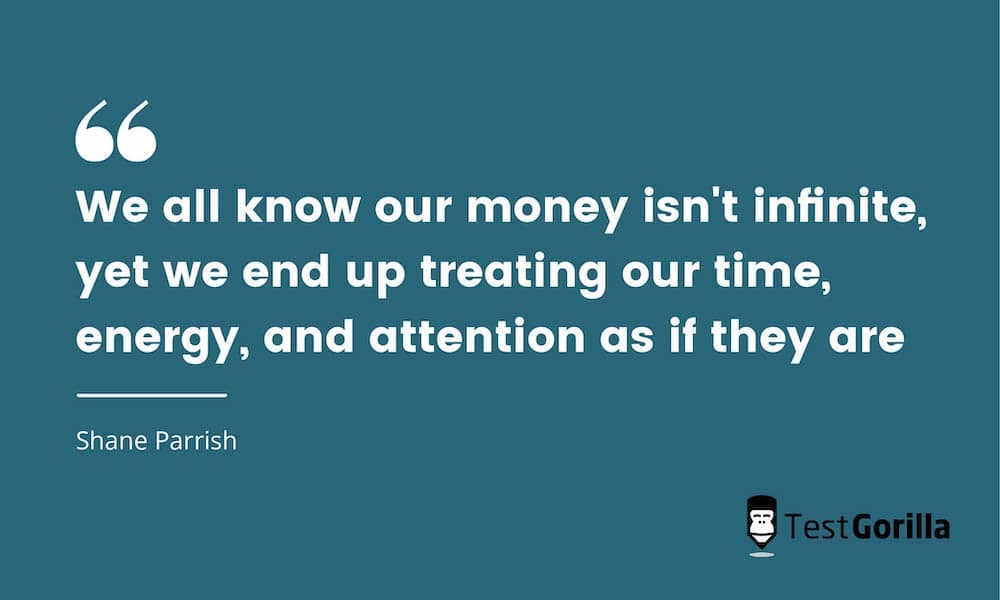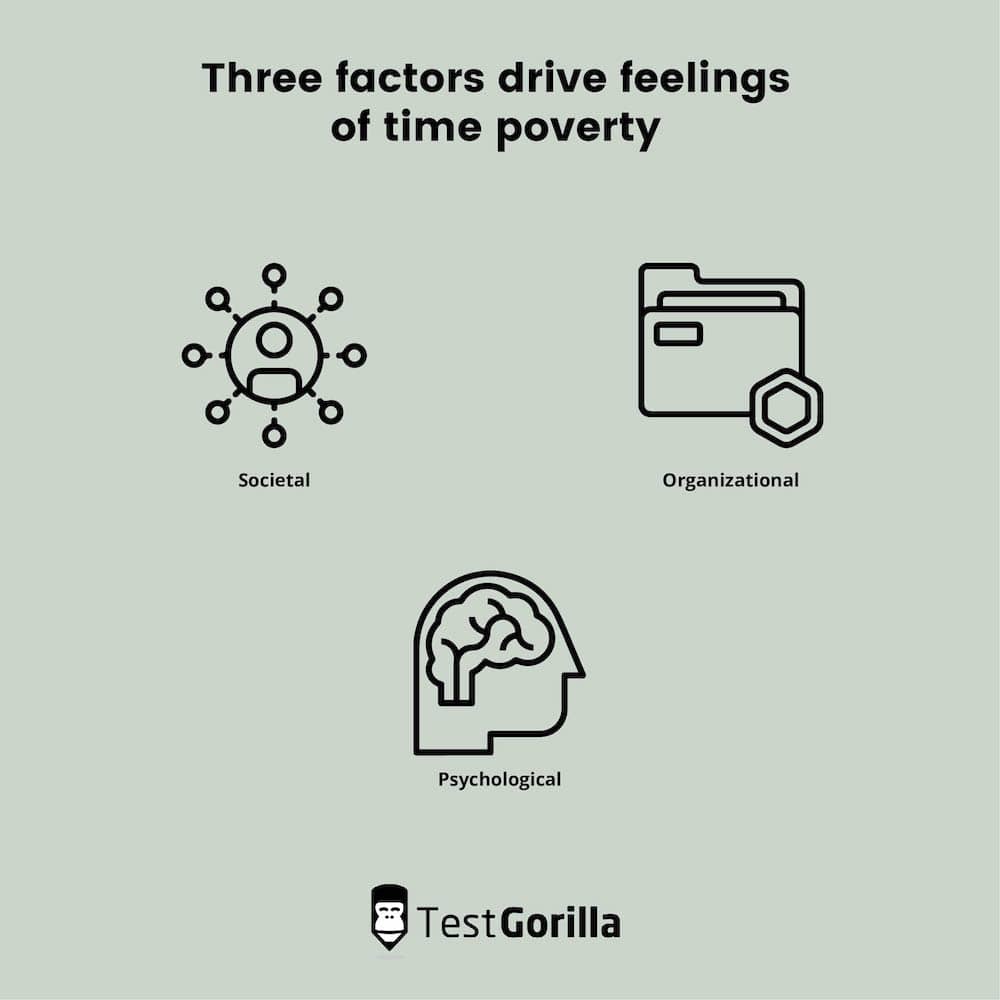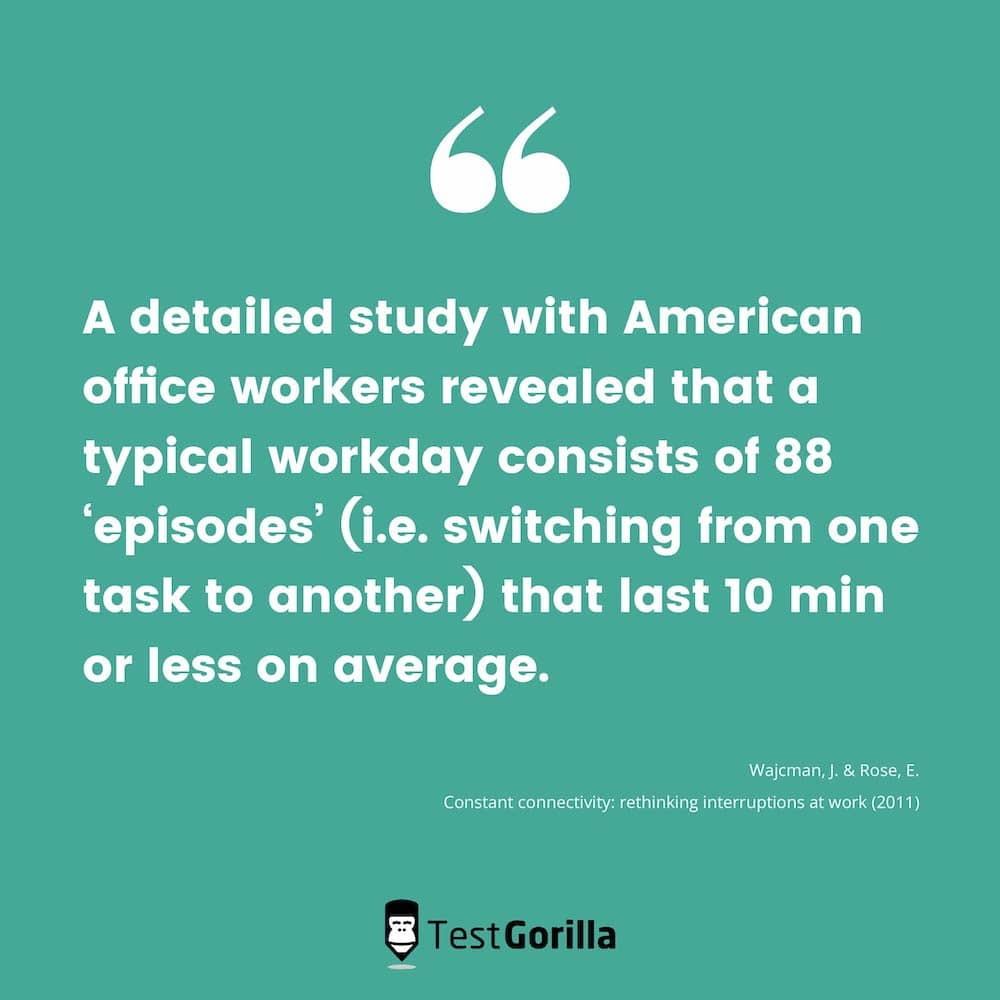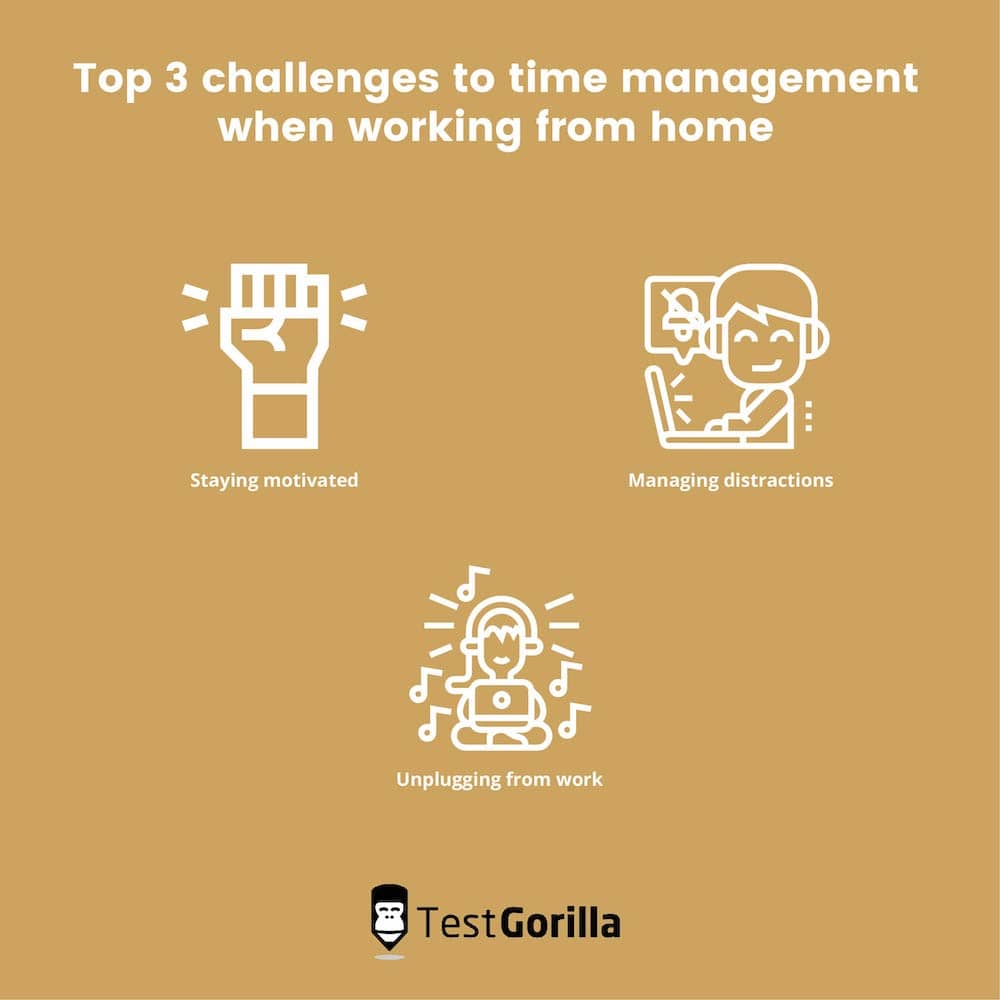Improved focus, less stress, and a higher quality of work: globally, statistics generally suggest that better time management leads to all of these in employees. Despite this, it is a skill that most people neglect, at home and at work.
Development Academy, a top provider of personal development courses in the UK, polled 500 employees from a variety of industries in 2021 to understand more about people’s individual time-management systems. They discovered the following:
82% of people don’t have a time-management system
12.5% of people never feel in control at work
The least successful time-management system is “dealing with whatever comes up”
28% of people using this technique feel their work is never or very rarely under control
Only 20% of people carry out a monthly time audit to review how they are spending their time
There are clear benefits to having good time-management skills or an organization system. And for certain roles, it will be vital to hire candidates who already have excellent time management. But how can you help existing employees improve the ways they organize their time? This blog post is here to help.
Table of contents
Why is time management important?
We all have a limited number of hours in the day, and learning how to manage your time better is key to maximizing the time you do have. Everyone is familiar with time-related cliches: Time is money; time is precious. But we receive this wisdom flippantly and we don’t often treat our time like the finite resource it is.
Studies show that, although wealth has increased around the world, particularly in the West, people don’t feel time prosperous even if they feel relatively materially rich.
Feeling time poor
Representative data from 2011 shows that 70% of employed Americans reported feeling as though they never have enough time, and by 2018, this had increased to 80%.
The truth is that we don’t value our time enough, and this feeds into societal expectations about how much time we should dedicate to certain things. The gray areas, where we drag our brains from one task to the next, are little accounted for, and people are relatively insensitive to their own small losses of time, which inevitably add up.
According to a detailed set of qualitative interviews, even CEOs of well-established organizations who have control over their schedules spent only 43% of time engaged in activities ‘directly related to furthering their mission’
From a study launched by HBS’s Michael E. Porter and Nitin Nohria
Research from 2020 concludes that feelings of time poverty are driven by factors in three main categories: societal, organizational, and psychological.
Societal drivers of time poverty include an accelerated speed of life and working norms that emphasize hyper-productivity. Task-oriented jobs have become more complex and competitive, and society promotes a working mentality that equates employees’ loyalty and productivity with long work hours.
Organizational drivers of time poverty, whereby organizations can cause their own workforce to feel time-poor, center around the fragmentation of employee time. When various meetings and social obligations are imposed, performance is undermined. People need to be given the time and bandwidth to fully shift their attention from one task to the next.
Psychological drivers of time poverty occur because, relative to money, people tend to heavily undervalue their time. A study in 2018 found that only 48% of respondents preferred to have more time than money. This held true even for the most time-poor demographic: full-time working parents with children still living at home. This means people are less sensitive to losses of time than money.
So if you or anyone you work with is wondering why you feel as though you never have enough time, it’s not just you. And it doesn’t necessarily mean you are bad at organizing your time. In lots of ways, the world, with its global markets and 24/7 economies, is rigged to make us feel this way.
Fighting time poverty
Effective time management is about far more than having a good timetable and sticking to it. It requires an entire shift in mindset, one that will help individuals and organizations alike value time more.
Fighting the societal drivers is one hell of a task. How do you battle against the water you’re swimming in? Below are some tips on how employers and employees can do so:
First and most importantly, acknowledge that the experience of time poverty differs across socio-economic and demographic groups. Low-income workers often have more urgent and unpredictable work schedules, and women still generally invest more time into unpaid domestic labour. In fact, time inequality can be seen as a core indicator of gender inequality today.
Work to reduce the time inequality imposed by social structures. Pay people adequately for the time they spend performing services for you. Make a habit of showing people you value and appreciate the time they give you, and offer to alleviate burdens where you can.
Actively oppose social norms and the “always on” mentality which suggests that an ideal worker is one who works long hours. Understand that busyess is not necessarily a signal of productivity or success.
If you work within leadership or HR for an organization, you have a responsibility to help fight the organizational drivers behind time poverty. We suggest you take the following steps:
Fragment employee’s time as little as possible. Fragmenting work time leads to an undermined sense of control over work. It reduces productivity and can lead employees to feel as though they must multitask.
Avoid goal conflict. Giving employees too many administrative tasks that are not central to their primary roles can be detrimental. Of course, sometimes these things need to be done, but make sure your team knows which tasks are secondary so priorities aren’t disrupted.
Be skeptical of hours-based rewards and promotions. Your employees shouldn’t feel as though working longer, later hours is the only way they can impress and progress.
We owe it to ourselves and our well-being to fight against the psychological drivers of time poverty. Here are some things you can do to change the way you think about time:
Remind yourself of the value of your own, finite time. Our tendency to value money over time can be damaging, so it’s important to remember that you should spend your time just as wisely as you spend your money.
Adequately quantify your own time burdens. Research shows that the smaller the time cost, the more insensitive we are likely to be to it. Losing 30 minutes may not feel like a lot, but time adds up, so try to be more sensitive to these small losses.
Plan your time well. Managing your time effectively and avoiding procrastination could help free up time that you didn’t even realize you had (more on this below).
How can time management help?
Effective time management can go a long way in alleviating feelings of time poverty. It can help you do more in less time, as well as reduce the urge to procrastinate over work tasks.
It does take discipline and commitment to begin organizing your time well, especially when you’re working from home.
Chances are, you’ll find time and task management much easier to enforce if you have some help and support at work from your manager or employer.
How managers and employers can help employees organize their time
It is important that employers respect and value the time of the people who work for them in order to fight societal drivers of time poverty and the tendency we have to undervalue our time. Employees will all have differing priorities outside of work.
This being said, there is work to do and targets to be met, and all within a timeframe. There are steps you can take to hire people with excellent time management, but taking steps to encourage, reinforce and check in on time-management skills at work is one of the best things you can do for your existing employees and for your business.
Manager time vs maker time
American author and entrepreneur Paul Graham suggests that there are two types of schedule: the manager’s schedule, and the maker’s schedule.
The manager’s schedule is divided into one-hour intervals and consists largely of meeting with people. Several hours can be blocked off for certain tasks if needed, but generally, you change what you’re doing on an hour-by-hour basis at least.
In contrast, the maker’s schedule is generally divided into units of at least half a day. This schedule is common among writers, programmers, and, engineers – in other words, people who make things. A single meeting can break an afternoon in two, fragmenting maker’s time into pieces too small for them to commit to something hard and lengthy.
Each type of schedule works fine by itself. Problems arise when they meet. Since most powerful people operate on the manager’s schedule, they’re in a position to make everyone resonate at their frequency if they want to. But the smarter ones restrain themselves, if they know that some of the people working for them need long chunks of time to work in.
Paul Graham
This idea is reinforced by evidence that avoiding fragmenting an employee’s time is a good way to alleviate feelings of time poverty. So, being conscious that some people will probably be working on a maker’s schedule could be helpful for your employees.
4 steps to assist employees in time management
Here are four steps you should take as a manager or employer to help ensure efficiency among employees.
Make your expectations clear. It will save everyone time if employees don’t need to seek clarification about their tasks.
Provide a timeline. Be explicit about when things need to be done by. If tasks are repeatedly completed late, check in – it might be that people aren’t managing their time well, or that expectations are being set too high.
Ask team members how they work best. Trust them, and allow them to work in a way that suits them. If this has counterproductive results, help them implement some of the time-management strategies below.
Ask for feedback. Employees might clock organizational obstacles to their own time-management skills that fall beneath your radar as a manager.
7 time-management strategies to use for work
When it comes to personal organization, everyone is different. At the end of the day, there is no right or wrong way to organize your time. Here, however, are seven strategies that are proven to be useful in boosting efficiency and productivity, whether you work from the office or at home.
Take things day-by-day
Starting each day with a to-do list of some kind means that you’ll know what you need to get done as soon as you sit down at your desk. Taking things a day at a time divides the larger aims that you and your team are striving for into manageable, bite-sized chunks.
Set and revise goals
Set your daily to-do lists down on paper or whatever digital substitute you tend to use. Stick to your plan and commit to one thing at a time, so that you avoid fragmenting your own time any further. Remember that if you are a maker, you might need to schedule an entire afternoon or longer for a given task.
It’s important to revise these goals and to-dos, too. If you are consistently failing to do all the things you’re setting out to do, or tasks are taking longer than expected, the chances are you’re putting too much on your plate. Revise and adjust your goals – finishing your days and weeks with a clean plate will make it easier for you to relax when you’re not working.
Prioritize and communicate
Tasks will inevitably run over sometimes, even if you are adjusting your daily and weekly goals as you learn about your own productivity. Effective prioritization will ensure that the most pressing things are sorted first.
If you need to leave things for another day, better for it to be the menial, administrative bits and bobs than tasks that are important steps in meeting big deadlines. You’ll lose less sleep over a few late email responses than an overdue report. If people are awaiting responses from you, communicate – let them know that you’re busy, and get back to them once your priorities have been attended to.
Avoid multitasking
No matter how good you think you are at multitasking, you’re probably worse than you think. Only around 2% of the population are effective multitaskers, and frequent task-shifting actually reduces productivity because our brains need time to refocus after each shift.
Psychologists call this a “task switch cost.” This mental cost means that trying to multitask is detrimental to productivity and hinders time management. It may reduce your performance and make you more prone to mistakes. If you tend to work while you eat your lunch, don’t: Focus on one thing at a time to finish tasks faster and with more accuracy.
Remove distractions
The modern world as it stands is a heavily over-stimulating place; new or interesting things that we might give our attention to lie around every corner. While you are dedicating your time to a single task, try to remove any distractions – perhaps turn off your notifications for an hour, or lock your phone away.
Distractions will differ in type and volume depending on what your job is and where you work. With a rise in apps that will help you block distractions in order to focus, there is a general consensus that removing distractions increases productivity and helps prevent procrastination, the mother of all time-killers.
One way to boost our will power and focus is to manage our distractions instead of letting them manage us
Dr. Daniel Goleman
Block off time for deep focus
We’ve already addressed how fragmented time can worsen feelings of time poverty and interrupt workflow to affect productivity. One way you can try to avoid this, especially if you are someone with a maker’s schedule, is to block off time in your work calendar for deep focus.
Remaining respectful of your needs and boundaries, people will avoid getting in touch unless they genuinely need you, and you can dedicate this time to the task at hand. Be stubborn about these boundaries when you need to be. If you’re someone who is frequently contacted for queries and finds it hard to say no, take an extra step and notify your teammates about the time you’re blocking off.
Use a timer
Setting a timer can help you remain committed to a spcific task for a certain amount of time. It’s a great way to zone in and break up the day. Schedule some well-deserved coffee breaks in between.
Using a timer can also give you a valuable feeling of accomplishment. Getting to the end of the allocated time having done what you set out to do, without giving in to distractions, is rewarding and can spark motivation to move swiftly on to the next thing. It also helps with the task-switch costs we were talking about earlier – if you’re anticipating a switch, you’ll push harder to get the current task done in its allocated time.
Time management and working from home
According to a Stanford University study, 42% of the US workforce is now working from home full-time, accounting for more than two-thirds of the country’s economic activity. Working at home presents a whole new box of toys to procrastinate with, and so for some a different approach to time management is needed.
In terms of managing time, the main challenges that come with remote work are staying motivated, managing distractions at home, and not being able to unplug from work at the end of the day. Below are some tips on how to manage each of these.
Staying motivated
At the office, you’re surrounded by other people who are also in that space to work. Whether you realize it or not, this alone is a big motivating factor that working from home removes. Without face-to-face interaction with teammates and the protective work bubble that the office provides, motivation drops, and time management goes out the window. To pick it back up, you should:
Create a routine, but don’t be afraid to experiment with your schedule – everyone is different, and flexibility is the main benefit of working from home. Change can be iinspiring, and, if you’re up to it, you can use it to challenge yourself. You might learn a lot about the way you work.
Take things day by day, and when you achieve something, reward yourself, even if it’s just a small task. Incentives are good motivators and you can gear your rewards towards self-care.
Managing distractions
If you’ve ever been sitting at your desk when an intense urge to deep-clean the kitchen overcomes you, you’re not alone. As discussed above, distractions present a big threat to effective time management. Here are some tips for managing distractions you’ve never had to battle with at the office:
Sit down to work in a clean, orderly, quiet space. The fewer hings there are around you, the less likely you are to want to move, tidy, or fiddle with them. Use timers, create a routine, and stick to it.
If you live with family or roommates who are around during the day or also working from home, ask that they don’t interrupt you. Maybe invest in some noise-canceling headphones.
Unplugging from work
Working from home blurs the lines between work commitments and your personal life. With both taking place in the same space, it can be hard to disconnect and properly relax. Good time management is about making sure you organize your downtime effectively, too. Try:
Creating a designated office space in your home. This way you can maintain some kind of physical boundary between your professional and personal lives. The clothes you wear will also affect this division in your mind, so, although it’s tempting, try not to sit and work in your pajamas.
If you use a personal laptop or computer for work, close all your work tabs at the end of the working day. Removing these visual work cues will make it easier to clock out mentally, and will help prevent work tabs from whirring on in your mind, too.
Using time-management assessments
Although you can use all of this content to help your existing employees improve their time-management skills, for future hires, testing for time management at the top of the recruitment funnel is the way to go.
TestGorilla’s time-management test assesses candidates through situational judgment type questions. The results will determine how well they can prioritize, plan, execute, reflect, and communicate to manage their time well in a professional environment.
Choose a plan that works for you and test candidates’ time management to start your journey with efficient, effective skills-based hiring.
Related posts
Hire the best candidates with TestGorilla
Create pre-employment assessments in minutes to screen candidates, save time, and hire the best talent.
Latest posts
The best advice in pre-employment testing, in your inbox.
No spam. Unsubscribe at any time.

Hire the best. No bias. No stress.
Our screening tests identify the best candidates and make your hiring decisions faster, easier, and bias-free.
Free resources
This checklist covers key features you should look for when choosing a skills testing platform
This resource will help you develop an onboarding checklist for new hires.
How to assess your candidates' attention to detail.
Learn how to get human resources certified through HRCI or SHRM.
Learn how you can improve the level of talent at your company.
Learn how CapitalT reduced hiring bias with online skills assessments.
Learn how to make the resume process more efficient and more effective.
Improve your hiring strategy with these 7 critical recruitment metrics.
Learn how Sukhi decreased time spent reviewing resumes by 83%!
Hire more efficiently with these hacks that 99% of recruiters aren't using.
Make a business case for diversity and inclusion initiatives with this data.
























